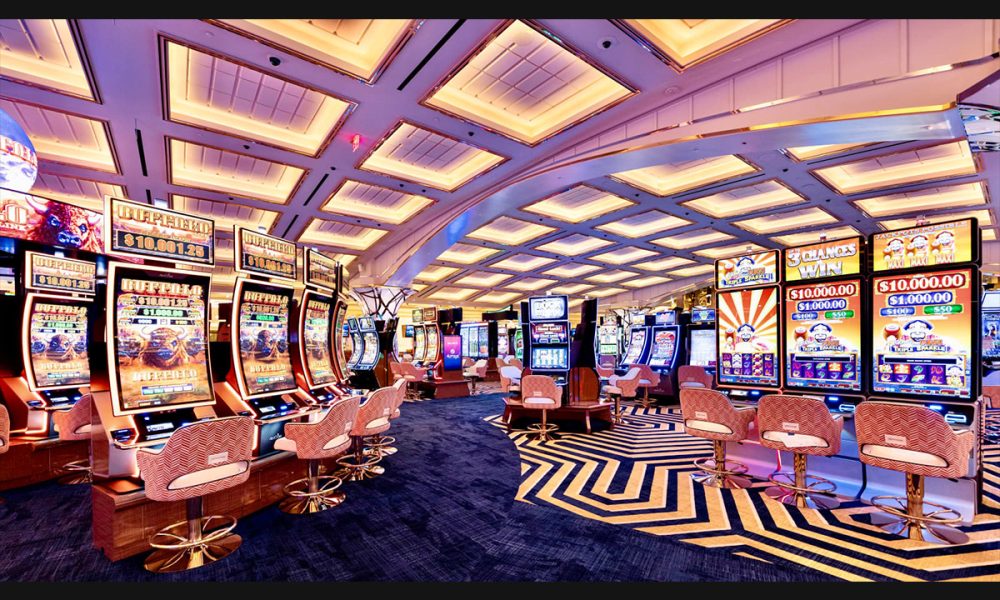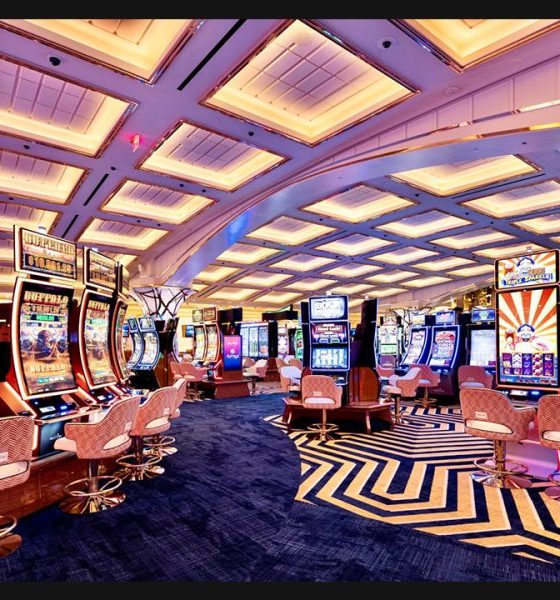

Gambling in the USA
Las Vegas Casino Culture Suffers Rejection by New Gen Gamblers
The latest statistics confirm the social chatter that Las Vegas tourism has hit a dramatic low, with some even calling Vegas an experience of the past.
Only 3.1 million people visited Sin City in June, down 11.3% compared to last year, according to the Las Vegas Convention and Visitors Authority (LVCVA).
Social media users have called out the high prices of everything from dining to parking, citing these and other reasons for staying away.
Robby Starbuck, conservative activist and host of “The Robby Starbuck Show,” says it is not just prices that are keeping people out of Vegas.
“Now nearly everyone under 40 who bets seems to do it online,” Starbuck said.
“I don’t know one person under 40 who goes to Vegas regularly to bet or play slots,” he added.
“This trend will continue with younger people because, honestly, our minds are wired differently.”
The U.S. online gambling market in 2024 was estimated at $12.68 billion, according to Grand View Research.
Starbuck said generational differences also could be pushing down the popularity of visiting Las Vegas.
“Another differentiator is that older generations focused on real-life interaction, while younger generations feel just as content with parasocial online experiences,” he said.
“The Vegas marketing image is one centered on slots and showgirls, two things young people have no interest in,” said Starbuck.
He added: “The typical casino feel and marketing just won’t be as successful with young people who have 40 options to gamble on their phones from the comfort of their own home.”
An additional generational difference, Starbuck pointed out, is that younger generations are ditching the bottle.
“Younger generations drink alcohol at lower rates than older generations did at their age. That’s going to have a material impact on the Vegas business model if young people drink less,” he said.
The number of people in their 20s who chose to abstain from alcohol more than doubled between 2001 and 2019, going from 9% to 22%, according to a 2019 National Drug Strategy Household survey. And a recent Gallup survey found that roughly 38% of adults under age 35 now identify as fully abstaining from alcohol.
In addition, more than a quarter of Gen Z respondents felt “very concerned” about the potential health effects of drinking alcohol, according to Civic Science.
The hotel industry is also feeling the burn of fewer visitors.
Occupancy rates dropped 6.5%, while average daily room rates have lowered to $163.64 – down 6.6%, according to the LVCVA.
Meanwhile, a 43-story hotel and casino has been put on an indefinite pause, SF Gate reported.
The property has a prime location on the Vegas strip and will remain an empty lot for parking for now.
Starbuck said he’s been to Las Vegas a number of times in his life and doesn’t see himself visiting again unless there is a change.
“If it feels like a place where I can see the future and bring my whole family, then you’ll see me in Vegas again,” he said.
“Without that kind of transformation, Vegas is in trouble in the coming decades,” he predicted.
“If Vegas wants to win with young people in the future, it’s going to have to transition to a must-see destination that makes you feel like you have just entered the future.”
The post Las Vegas Casino Culture Suffers Rejection by New Gen Gamblers appeared first on Gaming and Gambling Industry in the Americas.
Gambling in the USA
Gaming Americas Weekly Roundup – September 8-15

Welcome to our weekly roundup of American gambling news again! Here, we are going through the weekly highlights of the American gambling industry which include the latest news and new partnerships. Read on and get updated.
Latest News
IGT announced that its much-anticipated Wheel of Fortune Big Money Spin electronic table game (ETG) recently made its world debut at Downtown Grand Casino in Las Vegas, Nev. The vibrant standalone ETG game includes many of the attributes that have propelled the success of the Wheel of Fortune slots franchise for nearly three decades including word puzzles, wheel spins and exciting jackpot rewards. The game is accompanied by an attention-grabbing, 9-plus-feet upright video wheel that stands independent of the ETG terminals and entertains casino guests with the famous “WHEEL-OF-FORTUNE!” chant.
MGM Resorts International has announced that Corey Sanders, Chief Operating Officer, will retire from the company after more than 30 years of dedicated service and leadership. Sanders has agreed to remain COO through Dec. 31, 2025, and to serve as an advisor to the President and CEO through Dec. 31, 2026. The Company intends to name a new COO to serve as Sanders’ successor later this month. Sanders is currently MGM Resorts’ Chief Operating Officer, overseeing the company’s Las Vegas and regional properties as well as multiple corporate departments, including Hospitality, Gaming, Human Resources and Strategic Initiatives. Prior to that, he served as the company’s Chief Financial Officer and Treasurer.
Members of Kletsel Dehe Wintun Nation, the Sherwood Valley Rancheria of Pomo Indians, the Mechoopda Indian Tribe of Chico Rancheria and Big Lagoon Rancheria gathered outside the State Capitol in Sacramento to protest Assembly Bill 831 (AB 831). If passed, the bill would limit economic opportunities available to less wealthy tribes in the state by banning legitimate online social games using sweepstakes promotions. It would also eliminate more than $1 billion of existing economic activity generated by the industry in California, and close off a potential new revenue source for the state via sensible, modern regulation and taxation.
Partnerships
Genius Sports Limited has expanded its long-term partnership with Hard Rock Bet Sportsbook (Hard Rock Bet) to power the top-rated platform with its market-leading official data, trading and marketing solutions, as well as its ground-breaking BetVision product. Genius Sports has worked in partnership with the leading operator since 2021, providing the highest quality official data and pinpoint trading solutions across top tier leagues globally, including the Premier League, Serie A, European Leagues, Liga MX, NFL and more. Hard Rock Bet will be able to provide its customers with Genius Sports’ first-of-its-kind BetVision low latency streaming solution.
Quick Custom Intelligence (QCI), a leading provider of data-driven casino intelligence and player engagement platforms, has announced that Dania Beach Casino is continuing to benefit from its deployment of the QCI Nimble platform. While the property currently focuses on the QCI Host and QCI Marketing modules, it has expressed enthusiasm about the capabilities of the new AGI56 release and its impact on future customer engagement strategies. AGI56 represents the most ambitious release in QCI’s history, with the platform undergoing a full refresh of its technology stack, improved integration of advanced analytics, and the introduction of generative AI-driven tooling through Chatalytics.com. QCI’s platform is currently deployed in more than 350 casinos worldwide.
The post Gaming Americas Weekly Roundup – September 8-15 appeared first on European Gaming Industry News.
Gambling in the USA
TCSJOHNHUXLEY to Sponsor Inaugural G2E Dealer Championship

G2E Las Vegas 2025 is set to host the first-ever US Dealer Championship, and TCSJOHNHUXLEY is delighted to announce its sponsorship of this landmark event. The championship, which celebrates the skill and professionalism of casino dealers, will take place at The Venetian Expo from October 7-9, 2025.
The G2E Dealer Championship will bring together the nation’s top casino dealers to compete for the title of “Best Dealer.” Contestants will be judged on their technical precision, game knowledge, and ability to provide a superior player experience.
As a proud sponsor TCSJOHNHUXLEY will be supplying all the Roulette tables for the competition, ensuring the highest standard of equipment for the championship. This not only highlights the company’s commitment to the dealers but also provides the perfect platform to showcase its renowned manufacturing expertise. TCSJOHNHUXLEY’s world-class Roulette tables are testament to the precision engineering and superior craftsmanship that has set the industry standard for decades.
Phil Lee, TCSJOHNHUXLEY Chief Financial Officer & Managing Director Americas comments, “We are delighted to be a part of the first G2E Dealer Championship, an event that truly celebrates the invaluable role of casino dealers. Dealers are the heart of the live gaming experience, and we are committed to supporting their success. Our outstanding Roulette tables will provide the perfect platform for these talented professionals to showcase their artistry and skill.”
The G2E Dealer Championship will take place at Booth #5225, located in The Strip at G2E.
The sponsorship underscores TCSJOHNHUXLEY’s unwavering commitment to the live gaming sector and the professionals who drive its success. The company invites all attendees to witness the championship and visit its stand at Booth #4439 during the expo to see its full range of innovative solutions.
The post TCSJOHNHUXLEY to Sponsor Inaugural G2E Dealer Championship appeared first on Gaming and Gambling Industry in the Americas.
Gambling in the USA
Kindbridge Research Institute Launches “Stigma Stand Down” for Military Mental Health

Kindbridge Research Institute (KRI), a national leader in behavioral addiction research, announced the launch of Stigma Stand Down (SSD), a Colorado statewide initiative dedicated to confronting stigma, breaking down barriers, and fostering resilience among active-duty service members, veterans, and their families impacted by mental health and gambling-related challenges.
Inspired by military “safety stand-downs,” SSD addresses the hidden burdens carried by those who serve, where stigma often prevents seeking help for mental health issues, including gambling disorder – a condition up to 3.5 times more prevalent in military populations than civilians. With over 60,000 active-duty, guard, and reserve personnel in Colorado, as well as the rapid growth of legalized sports betting since 2018, SSD arrives at a critical time to normalize conversations around mental health, PTSD, depression, substance use, and gambling-related harms.
“Stigma is a silent enemy that leaves our service members and veterans isolated, harming their families, units, and mission readiness. Stigma Stand Down is our frontline response: dismantling shame and delivering free, confidential, evidence-based care designed for military realities. We thank our partners for standing with us and call on more allies to help transform lives and build stronger communities,” said Mark Lucia, Director of Programming at Kindbridge Research Institute.
Key elements of Stigma Stand Down include:
• Education and Resources: Practical, no-jargon webinars, videos, and courses on gambling disorder, mental health, financial literacy, and stigma reduction, accessible via a dedicated, mobile-friendly website for leaders, families, and providers.
• Free Mental Health Support: Through a partnership with Kindbridge Behavioral Health – a specialized national telehealth provider for gaming, gambling, and mental health issues – military members and their families can access free, confidential virtual therapy sessions.
• Statewide Outreach: Multimedia campaigns, on-base distributions, geographically targeted ads, and veteran-led stories to reach rural and underserved areas, fostering a culture where seeking help is seen as strength.
• Self-Assessment Tools: An anonymous Gambling Self-Check (BBGS) screener providing immediate, personalized feedback to encourage early intervention.
SSD builds on insights from KRI’s 50×4 Vets initiative and partnerships with organizations including the University of Nevada Las Vegas, University of New Mexico, Cactus Advertising Agency, and Kindbridge Behavioral Health. This program was made possible through grants provided by the Colorado Division of Gaming and FanDuel.
The post Kindbridge Research Institute Launches “Stigma Stand Down” for Military Mental Health appeared first on Gaming and Gambling Industry in the Americas.
-

 gaming3 years ago
gaming3 years agoODIN by 4Players: Immersive, state-of-the-art in-game audio launches into the next generation of gaming
-
EEG iGaming Directory9 years ago
iSoftBet continues to grow with new release Forest Mania
-
News8 years ago
Softbroke collaborates with Asia Live Tech for the expansion of the service line in the igaming market
-
News7 years ago
Super Bowl LIII: NFL Fans Can Bet on the #1 Sportsbook Review Site Betting-Super-Bowl.com, Providing Free Unbiased and Trusted News, Picks and Predictions
-
iGaming Industry8 years ago
Rick Meitzler appointed to the Indian Gaming Magazine Advisory Board for 2018
-
News7 years ago
REVEALED: Top eSports players set to earn $3.2 million in 2019
-
iGaming Industry8 years ago
French Senator raises Loot Boxes to France’s Gambling Regulator
-
News7 years ago
Exclusive Interview with Miklos Handa (Founder of the email marketing solutions, “MailMike.net”), speaker at Vienna International Gaming Expo 2018









